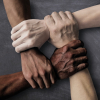
This is an excellent piece on the sometimes awkward, but kind and necessary move toward true inclusion. This passage nails the problems with (typically) conservative thinking in this regard and why it’s a problem:
I was a child of privilege in the small town where I spent my teenage years, but I knew plenty of kids in my public junior high and high school whose dads were “on disability,” that is to say, receiving Supplemental Security Income or Social Security Disability Insurance, really the only working-class welfare benefits left following Bill Clinton and his New Democrats’ disastrous “welfare reform.” We made fun of them, as cruel and thoughtless teenagers are wont to do. They weren’t in wheelchairs. They weren’t crippled. They could walk. They could drive. Some of them even mowed their own lawns! We had been socialized to believe that they were scammers, to be mocked simultaneously for being lazy and poor and for being conniving fraudsters on the make, getting rich off the government. The obvious contradiction of these insults made them all the worse.
Now that I am older, and aside from regretting these childhood cruelties simply for their meanness and lack of charity, I recognize the pain those men (we hardly thought of the women: another sort of insult), who could walk, yes, but could not climb the stairs, who slept upright in the living-room La-Z-Boy because it was too painful to lay flat, who had trouble with their insulin, who couldn’t hear you unless you shouted, or who were rattled by loud noises.






